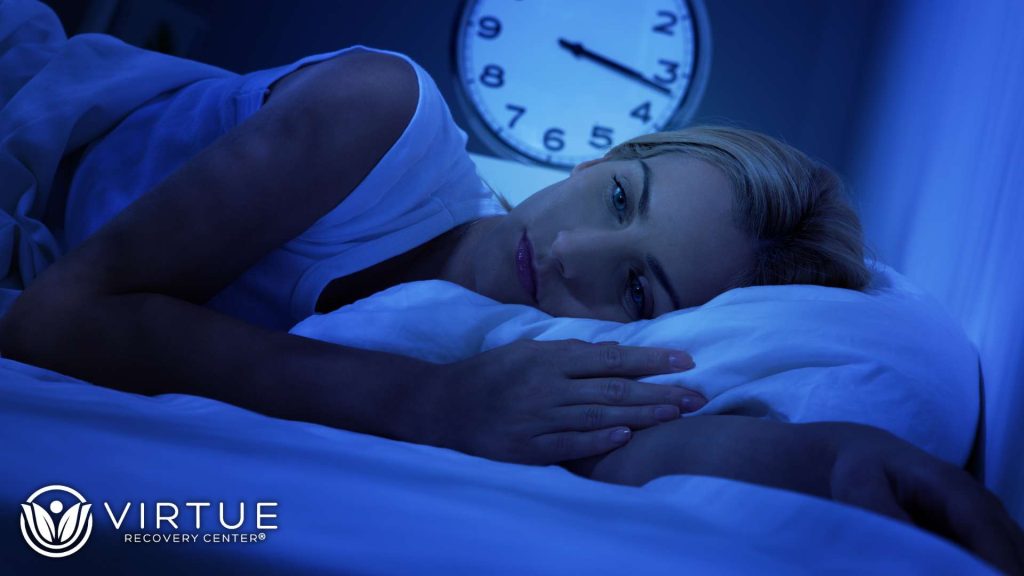Key Takeaways
- Melatonin is a natural hormone that helps the body manage sleep.
- It’s not considered chemically addictive but can lead to habits that feel like dependency.
- Side effects may include drowsiness, dizziness, and headaches.
- Taking too much melatonin or relying on it daily may disrupt natural sleep cycles.
- Melatonin works best when paired with good sleep habits.
Introduction
Melatonin is everywhere—from vitamin store shelves to bedtime routines. It’s often seen as a safe, natural way to fall asleep faster. But with more people using it daily, some are starting to wonder: Is melatonin addictive?
This article breaks down everything you need to know about melatonin. We’ll look at what it is, how it works, possible side effects, how much is too much, and whether long-term use can cause problems. If you or someone you love depends on melatonin—or any sleep aid—to fall asleep, you’re not alone. And there are ways to get back to sleeping well naturally.
What Is Melatonin and How Does It Work?
Melatonin is a hormone your body makes on its own. It’s produced by a small gland in your brain, called the pineal gland. Your body usually releases melatonin when it starts to get dark outside, helping your brain know it’s time to slow down and get ready for sleep.
Melatonin is part of your body’s circadian rhythm—the internal clock that tells you when to wake up and when to go to bed. Bright lights at night, late-night screen time, and changing time zones can all mess with your natural melatonin levels.
That’s where melatonin supplements come in. These pills or gummies are designed to boost melatonin levels and help people fall asleep faster. But taking them regularly can raise questions about safety and dependency.
Is Melatonin Addictive?
The short answer? No—melatonin is not chemically addictive. Unlike prescription sleep aids or opioids, melatonin doesn’t create a high or cause physical withdrawal.
However, it can still become a habit. Some people take it every night, even if they don’t need it anymore. Over time, they may believe they can’t sleep without it, even though their body is capable of producing melatonin naturally.
This can lead to a type of psychological dependence, where you feel anxious or restless if you forget your nighttime dose. That’s not true addiction, but it can interfere with your sleep habits and make things worse over time.
Common Uses of Melatonin
Melatonin can be helpful when used for specific situations. It’s often used to treat:
- Jet lag (when your body clock is thrown off by travel)
- Shift work disorder (people who work nights or rotating schedules)
- Delayed sleep phase disorder (trouble falling asleep at a typical time)
- Mild insomnia
- Sleep troubles in kids with ADHD or autism, with doctor approval
Some people also use melatonin to stop relying on prescription sleep medications, hoping for a gentler, more natural option.
Melatonin Dosage: How Much Is Safe?
When it comes to melatonin, less is more. A common mistake is thinking a higher dose works better, but that’s not always true.
Most people benefit from doses between 0.5 mg to 3 mg taken about 30 minutes before bedtime. Higher doses like 5 mg or more may cause side effects or leave you feeling groggy in the morning.
It’s best to start small and see how your body reacts. Children and teens should only use melatonin under medical supervision, and long-term use should always be discussed with a doctor.
Side Effects of Melatonin Use
Melatonin is generally safe when taken correctly and for a short period. Still, some people may notice side effects, especially at higher doses.
These may include:
- Daytime drowsiness
- Headaches
- Dizziness
- Upset stomach
- Vivid dreams or nightmares
Most side effects go away on their own, but if they don’t—or if they get worse—it’s a sign to pause and talk to a doctor.
Melatonin Interactions: What to Watch For
Melatonin may not mix well with certain medications or substances. That’s why it’s important to talk to your doctor if you’re taking anything else.
It may interact with:
- Blood thinners
- Birth control pills
- Antidepressants
- Seizure medications
- High blood pressure drugs
You should also avoid combining melatonin with:
- Alcohol
- Sedatives
- Other sleep aids
Doing so can make you feel overly sleepy, confused, or dizzy—and increase your risk of accidents or overdose.
Can You Become Dependent on Melatonin?
While melatonin isn’t addictive in a chemical sense, it can become a crutch.
You might start taking it every night—even when you don’t really need it. If you skip a dose, you may feel anxious about not sleeping. That kind of worry can actually make it harder to fall asleep, which defeats the purpose.
Worse, relying too much on melatonin might cover up deeper problems, like:
- Anxiety or stress
- Poor sleep habits (like too much screen time before bed)
- Depression
- Substance use
- Sleep disorders that need medical treatment
In these cases, melatonin isn’t solving the problem—it’s just masking the symptoms.
How to Use Melatonin Safely
If you choose to take melatonin, keep these tips in mind:
- Use it for short periods, not as a long-term solution
- Start with a low dose—you can always increase if needed
- Avoid screens an hour before bed to help your brain make natural melatonin
- Go to bed and wake up at the same time every day
- Create a bedtime routine to help your body know when it’s time to sleep
- Talk to a doctor before taking melatonin every night or for long periods
Most of all, focus on sleep hygiene—the habits and environment that support good sleep. That includes keeping your room dark, cool, and quiet, and winding down before bed without devices or stress.
When to Get Help for Sleep Aid Use or Dependency
If you’ve been using melatonin—or any sleep aid—for weeks or months and still can’t sleep without it, it may be time to ask for help.
You might need support if:
- You feel nervous or restless without your sleep supplement
- You keep increasing the dose but it’s not working
- You’re combining melatonin with alcohol or other drugs
- Your sleep problems are affecting your mood, focus, or daily life
At Virtue Recovery Killeen, we understand how frustrating sleep issues can be. We help people explore the root cause of their sleep problems, whether it’s stress, substance use, trauma, or mental health conditions—and we create a personalized plan to restore healthy, natural rest.
Conclusion
Melatonin can be a helpful tool—but it’s not a magic fix. It’s not addictive like other medications, but it can still become a habit that’s hard to break.
Good sleep comes from more than a pill. It comes from treating your body and mind with care. And if you’re struggling with addiction, you don’t have to go through it alone.
Call 254-434-6764 today to talk to someone at Virtue Recovery Killeen. Whether you’re dealing with melatonin overuse, sleeping pill addiction, or something deeper—we’re here to help you find your way back to recovery.
FAQs
Is melatonin addictive like sleeping pills?
No, melatonin doesn’t create physical addiction like some prescription drugs. But it can become a habit or a psychological crutch.
How much melatonin should I take?
Start with 0.5 to 3 mg, about 30 minutes before bed. Always talk to your doctor before using it long-term.
Is it safe to take melatonin every night?
For short periods, yes. But long-term use without medical guidance could lead to dependency or mask deeper issues.
What are the side effects of melatonin?
Some people feel groggy, dizzy, or have vivid dreams. Side effects are more common at higher doses.
How is melatonin dependence not the same as melatonin addiction?
Melatonin dependence refers to relying on the supplement for sleep, while addiction involves compulsive use and cravings—melatonin is not habit-forming or addictive.
What sleep disorders is melatonin usage good for?
Melatonin is commonly used for insomnia, delayed sleep phase disorder, jet lag, and some circadian rhythm sleep disorders.
What are the long-term effects of using melatonin regularly?
Long-term melatonin use is generally considered safe for most people, though more research is needed; some may experience headaches, dizziness, or daytime drowsiness.
What dose of melatonin should I take for insomnia?
A low dose of 0.5 to 3 mg taken 30–60 minutes before bed is typically effective for insomnia; higher doses are not necessarily more helpful and can disrupt sleep.
Is melatonin for sleep safe for children?
Melatonin can be safe for short-term use in children under medical guidance, especially for sleep disorders like autism-related insomnia, but should not be used without pediatric supervision.
Does the body naturally make melatonin to sleep?
Yes, the body produces melatonin naturally in the brain’s pineal gland, especially in response to darkness, to help regulate sleep-wake cycles.
Is melatonin safe for improving healthy sleep hygiene?
Melatonin can support better sleep habits when used correctly, but it should complement—not replace—good sleep hygiene practices like limiting screen time and maintaining a consistent bedtime.
Resources
https://pmc.ncbi.nlm.nih.gov/articles/PMC6033744/
https://www.nytimes.com/2022/09/06/well/mind/melatonin-dependency.html
https://www.nhs.uk/medicines/melatonin/common-questions-about-melatonin/
- About the Author
- Latest Posts
Nicki Lugo is currently employed as Clinical Director at Virtue Recovery Center in Las Vegas. Nicki is a licensed clinical professional counselor (CPC) in the state of Nevada and a licensed associate counselor (LAC) in the state of Arizona. She is also a licensed clinical alcohol and drug counselor (LCADC) in Nevada. Additionally, Nicki has specialized training in treating trauma and is a certified clinical trauma specialist (CCTS).
Nicki has earned a Master of Science degree in Psychology with an emphasis in Behavioral Health from the University of Phoenix and a Master of Science in Professional Counseling from Grand Canyon University. Currently, Nicki is pursuing a Doctor of Philosophy (PhD) in Counseling Education and Supervision at Grand Canyon University. Nicki’s research interests include the use of Positive Psychology interventions with dual diagnosis clients. Nicki hopes to contribute to the body of knowledge in treating substance use disorders.
Nicki’s long-term career goals include advancing in leadership roles within Virtue Recovery Center which is a quickly growing substance use disorder treatment facility. She hopes that one day her research and advocacy will help to save the lives of those who have been affected by substance use. She likes to say that advocacy is her passion and leadership is her superpower.









